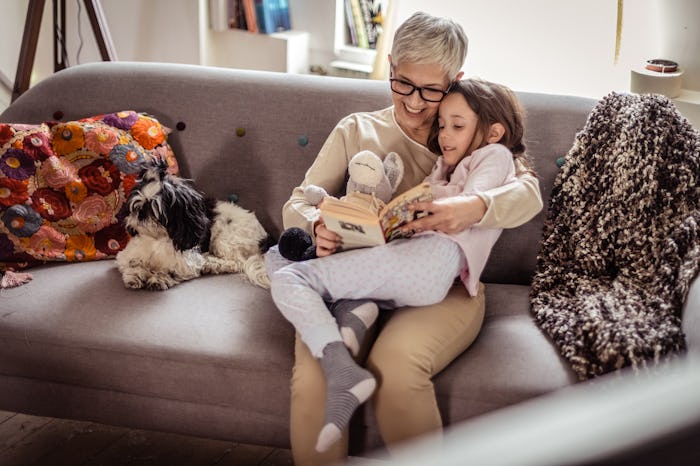Life

After Weeks Of Social Distancing, Can You Call In The Grandparents For Back-Up Now?
You've been stuck inside with your kids for what feels like months now. The calendar tells you however that it's just been a measly 30 or so days. But once everyone hit the 14-day mark, the true itch to get out set in. Isn't that the magic number for safety? Surely that means grandparents can visit their grandchildren now and give you (and your kids) some much-needed help, right?
Unfortunately, that idea might be just a bit premature. Dr. Niket Sonpal, a New York-based internist and gastroenterologist, tells Romper this way of thinking is a "slippery slope."
"You would think that it is safe, but the reality is that this outbreak is bigger than any family or group of connected households," he tells Romper. "Depending on the infections in your state and city, you may be at great risk by deciding to leave the house to meet with your family members."
Regardless of whether or not you feel the benefits outweigh the risks where visiting relatives is concerned, many states are currently under stay-at-home orders. What this means for each individual state and even local communities varies slightly, but in general, people under stay-at-home orders are prohibited from leaving their homes except for a short list of essential activities — visiting relatives just for the fun of it doesn't make the cut.
"These are tough times and require tough choices," Kansas-based pediatrician Dr. Natasha Burgert tells Romper. "People have had family members leaving the home for essential visits, accepting packages and deliveries, and spending times outdoors during the last 14 days; so they are not isolated."
Dr. Scott Krugman, vice chair of pediatrics at the Herman & Walter Samuelson Children’s Hospital at Sinai Hospital of Baltimore, tells Romper that anytime someone in your household is exposed to things outside of the home, the 14-day count actually starts all over again. "Unfortunately for families of health care providers or other essential workers, the count starts over daily," he says. "The best and safest response is to not have get-togethers."
Both the Centers For Disease Control (CDC) and the White House's current coronavirus guidelines clearly direct older individuals to stay away from other people, as those older than 65 are at an increased risk for complications should they contract COVID-19. Additionally, the White House's recommendations to slow the spread advise all Americans to avoid discretionary travel including "social visits." Instead of an in-person visit, you can take advantage of technology and set up video calls or Zoom sessions with grandma and grandpa from the safety of your own home. It's not the same as a giant bear hug, but it's the safest way right now.
"Staying at home is not only prudent and responsible, but it also eliminates doubt or anxiety that you may have accidentally brought something to your friend, mother, or elder," Dr. Sonpal explains.
Because some people infected with coronavirus may be asymptomatic or not show symptoms for as many as 14 days, according to the CDC, it could be nearly impossible to know whether or not you have it before coming into contact with another person. This means you could unintentionally spread the virus without knowing you have it. Even if it has been 14 days since your last grocery trip, if you checked your mail, received a package, or accidentally came within 6 feet of someone while walking your dog, you could still potentially spread the virus to a loved one if you visit them.
"We cannot make justifications for breaking stay-at-home orders based on what we 'feel' is safe, especially with an incomplete knowledge base of this potentially fatal disease," Dr. Burgert says. "That would be unsafe and unwise."
I get it. I really do. I'm going just as stir-crazy as anyone and the temptation to pop in for a visit with loved ones right now is perhaps greater even than my desire for schools to open again just so that I can have a few kid-free hours. Ultimately though, if seeing my beloved relatives puts them at a higher risk of contracting coronavirus, it's just not worth it.
Experts:
Dr. Niket Sonpal, New York-based internist, gastroenterologist, and adjunct professor at Touro College
Dr. Natasha Burgert, MD, FAAP, pediatrician in Overland Park, Kansas, who writes at KCKidsDoc.com
Dr. Scott Krugman, M.D., MS, FAAP, vice chair of pediatrics, Herman & Walter Samuelson Children’s Hospital at Sinai Hospital of Baltimore